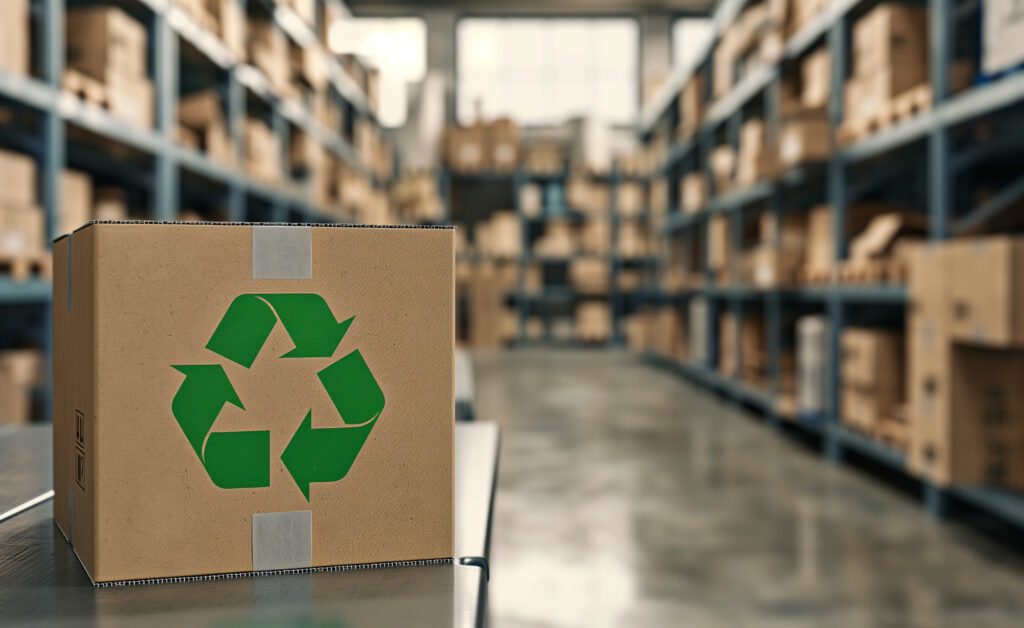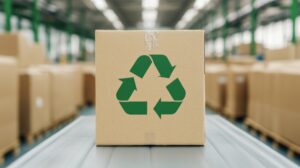Packaging waste represents a major environmental challenge worldwide, leading many countries to implement regulations aimed at reducing it. In the U.S., various states have introduced their own laws to manage and minimize packaging waste. These regulations are frequently part of Extended Producer Responsibility (EPR) programs, which place responsibility on producers for the entire lifecycle of packaging, from production to disposal.
Who Do These Packaging Laws Apply To?
The packaging regulations in the U.S. apply primarily to manufacturers, producers, and importers of packaging materials. Companies that package products in plastics, paper, glass, or other materials are the primary targets, as these industries contribute significantly to packaging waste. In some states, the laws extend to retailers and distributors who use packaging for shipping or sales.
Which U.S. States Have Packaging EPR Laws?
As of 2024, seven U.S. states have active EPR or similar packaging laws: California, Colorado, Maine, Oregon, New Jersey, Minnesota, and Washington.
Each state has its own version of packaging legislation, but most laws focus on reducing packaging waste, encouraging recycling, and ensuring that producers are responsible for the entire lifecycle of their packaging materials.
Regulations and Reporting Deadlines by State
California: Plastic Pollution Prevention and Packaging Producer Responsibility Act (SB 54)
California’s Plastic Pollution Prevention and Packaging Producer Responsibility Act (SB 54) aims to reduce packaging and packaging waste to meet the state’s recycling and climate goals and build a circular economy. By 2032, the law requires:
- 100% of packaging in the state to be recyclable or compostable
- 65% of all single-use plastic packaging to be recycled
- 25% reduction in plastic packaging
The legislation shifts the plastic pollution burden from consumers to the plastics industry and instructs producers to create a Producer Responsibility Organization (PRO) and implement an EPR program. The EPR program requires producers to design, fund, and run a statewide program that collects and recycles/composts discarded products.
Timeline for California’s EPR Law for Packaging:
- April 2025: Producers must register with the Circular Action Alliance (CAA), the approved PRO for California
- August 2025: Producers must report the first 6 months of 2025 packaging data to the CAA
- January 2026: Producers must report 12 months of 2025 packaging data to the CAA
- April 2026: The CAA aims to release a fee schedule based on the reported data
- January 2027: Deadline for statutory producer fee obligations, including any eco-modulation fees designed to incentivize sustainable packaging practices
Additionally, under a related bill, AB 793, producers must submit an annual report on their use of plastic containers by March 1 annually.
Colorado – Producer Responsibility Program for Statewide Recycling Act (HB 22-1355)
Colorado’s Producer Responsibility Program for Statewide Recycling Act (HB 22-1255) aims to reduce plastic waste and improve the state’s recycling rate, thus reducing the amount of recyclable material in landfills.
Producers of packaging and printed paper are responsible for funding the recycling system, including capital, operating, education, and promotion costs, which are built into producers’ wholesale prices and distributed throughout the supply chain.
Producers must report to the CAA as the approved PRO for Colorado. The CAA is responsible for setting up the statewide recycling system and submitting compliance reports to the Colorado Department of Public Health and Environment (CDPHE).
Colorado’s Extended Producer Responsibility (EPR) law for packaging, under House Bill 22-1355, has several key reporting deadlines:
- October 2024: Producers must register with the CAA
- August 2025: Producers must report the first six months of 2025 packaging data to the CAA
- October 2025: The CAA aims to release the fee schedule
- January 1, 2026: Producers must pay dues to the CAA
- May 2026: Producers must report the full 12 months of 2025 packaging data to the CAA
Maine – An Act to Support and Improve Municipal Recycling Programs to Save Taxpayer Money (LD 1541)
Maine’s LD 1541 bill shifts the responsibility and cost of managing packaging waste from municipalities and citizens to producers. It covers packaging materials only, such as plastic containers, cardboard boxes, and other non-recyclable materials.
The legislation is intended to reduce the volume and toxicity of packaging waste entering landfills and increase packaging material recycling. This waste management solution was also implemented to incentivize producers to place less packaging onto the market and to make the packaging more sustainable.
Companies in Maine must report their packaging waste to the Maine Department of Environmental Protection (DEP). Maine’s LD 1541 law mandates that producers submit detailed reports on the volume and type of packaging they place into the market. This data helps municipalities manage recycling costs.
The anticipated implementation schedule for LD 1541 is as follows:
- May 2026: Producers must register and report – reporting is limited to an estimate of the total tons of packaging produced during the calendar year 2025
- September 2026: Producers must pay the start-up registration fee (no more than 180 days after the effective date of the DEP contract with the SO)
- March 2027: Participating municipalities report on packaging material managed during calendar year 2026
- May 2027: Producers report on packaging material produced and sold in or into Maine during calendar year 2026
- September 2027: Producers make their first annual payment for packaging material sent in or into Maine during 2026
Oregon – Plastic Pollution and Recycling Modernization Act (SB 582)
The Plastic Pollution and Recycling and Modernization Act (SB 582) was implemented to overhaul Oregon’s outdated recycling system by building on local community programs and leveraging the resources of producers to cover the cost of improvements. It covers packaging, printing and writing paper, and food service ware.
The bill’s main goals are to increase access to recycling for everyone in the state, prevent plastic pollution by effectively recycling collected materials, and incentivize innovation by charging higher producer fees for non-recyclable products.
The Act requires producers to submit reports to the Oregon Department of Environmental Quality (DEQ). Producers must provide information on the amount and type of packaging they introduce to the market, which the state will then use to improve it’s recycling system.
As of July 2024, producers must have already registered with a PRO. By March 31, 2025, producers must submit sales data for 2024 to the PRO. The program officially begins implementation on July 1, 2025.
New Jersey – Recycled Content Law (P.L. 2021, c. 391)
New Jersey’s Recycled Content Law (P.L. 2021, c. 391) establishes post-consumer recycled content obligations for glass and rigid plastic containers, plastic and paper carryout bags, plastic beverage containers, and plastic trash bags. It also prohibits the sale of polystyrene loose-fill packaging.
The law aims to vitalize recycling markets by requiring manufacturers to meet minimum recycled content standards for the sale or distribution of products within the scope of the law. The law is also intended to help stabilize markets, increase recycling resiliency when oil prices fluctuate, and protect municipal recycling programs from the unpredictability of recycling costs.
Producers must report recycled content data for packaging to the New Jersey Department of Environmental Protection (NJDEP). The law requires producers to certify that their packaging materials meet the recycled content standards. Manufacturers must submit their first-year compliance reports by July 18, 2025, and annually thereafter.
Washington – Post Consumer Recycled Content Law (70A.245)
Chapter 70A.245 of Washington’s 2021 Plastics Law, the Post-Consumer Recycled Content Law, requires producers of common products sold in plastic packaging to register with the state, pay annual fees, and include a minimum amount of recycled plastic in their plastic product packaging. The law aims to reduce the production of new plastic and incentivize the development of new markets for recyclable plastic in the state.
As of January 1st, 2023, the law applies to plastic trash bags, plastic beverage bottles (except for dairy products and 187ml wine bottles), and plastic bottles for household cleaning and personal care products. Producers must also label packages that contain plastic trash bags sold or distributed within the state of Washington with the name and location of the producer, a uniform resource locator, or a quick response (QR) code to a website with the information.
Washington’s law mandates that producers report the recycled content of their packaging to the Washington State Department of Ecology. Companies must submit regular reports that detail how much of their packaging consists of post-consumer recycled material.
To comply with Washington State regulations, producers must be registered with the Waste Reduction Portal and file annual reports on April 1st.
Minnesota – The Packaging Waste and Cost Reduction Act (HF3911)
On May 22, 2024, Minnesota passed a new act that mandates producers to manage the lifecycle of packaging materials. This act covers all types of packaging, including paper, plastic, metal, or glass. However, the act exempts specific types of packaging, such as medical and hazardous materials.
It requires producers to register with a PRO which will handle costs related to waste management, including recycling and educational outreach. The reporting deadline for PROs is April 1, 2029. Producers who fail to register and fail to meet reporting requirements are subject to fines ranging from $25,000 to $100,000, depending on the severity of the violation.
Covered entities include public spaces, businesses or commercial properties, government institutions, academic buildings, and residential spaces. Producers must meet targets for recycling rates and use eco-friendly designs, with incentives for using recycled content.
Under Minnesota’s newly passed packaging EPR legislation, producers must report to the Minnesota Pollution Control Agency (MPCA). The law mandates detailed reporting on packaging waste and encourages the use of sustainable materials.
Compliance Timeline for HF3911:
- January 1, 2025: Producers must appoint a producer responsibility organization (PRO)
- July 1, 2025: Packaging producers must be members of a PRO registered in Minnesota
- January 1, 2029: Producers may not introduce covered materials without entering into a written agreement with a PRO to operate under an approved stewardship plan
- February 1, 2031: Producers cover at least 90% of net recycling costs
- After January 1, 2032: No producer may introduce covered materials unless the materials meet certain criteria as recyclable, refillable, or reusable, or the producer seeks an extension from the commissioner. The PRO will determine the criteria through a statewide needs assessment.
Penalties for Non-Compliance
The penalties for non-compliance vary by state, but missing deadlines or failing to comply with packaging laws can result in significant penalties, including fines and possible bans on the sale of non-compliant products. Complying with these regulations not only helps companies avoid penalties but also demonstrates corporate responsibility and commitment to sustainability. We’ll cover more on this in part two of this article.
Get Support
U.S. packaging laws are becoming more stringent as states aim to address environmental concerns related to packaging waste. Companies operating in these states must stay informed about their obligations, upcoming deadlines, and reporting requirements.
If you need assistance navigating your packaging compliance requirements, contact Tetra Tech’s product compliance experts today at [email protected]. We can help you understand the changes in scope that will affect you and can support you in keeping your compliance intact in the face of changing requirements.






